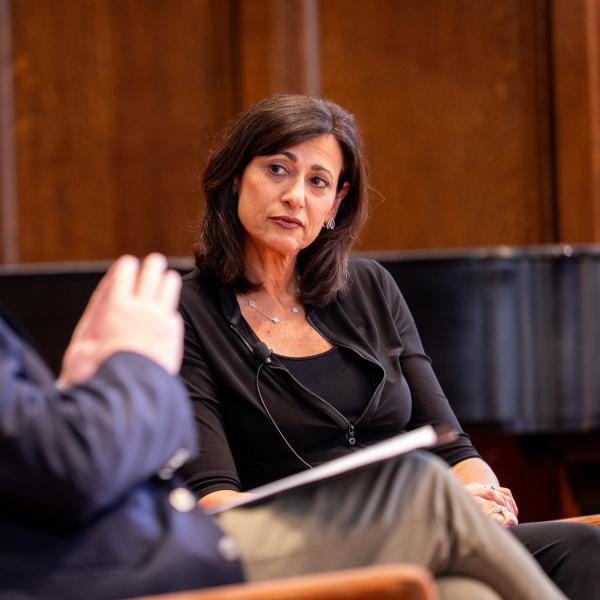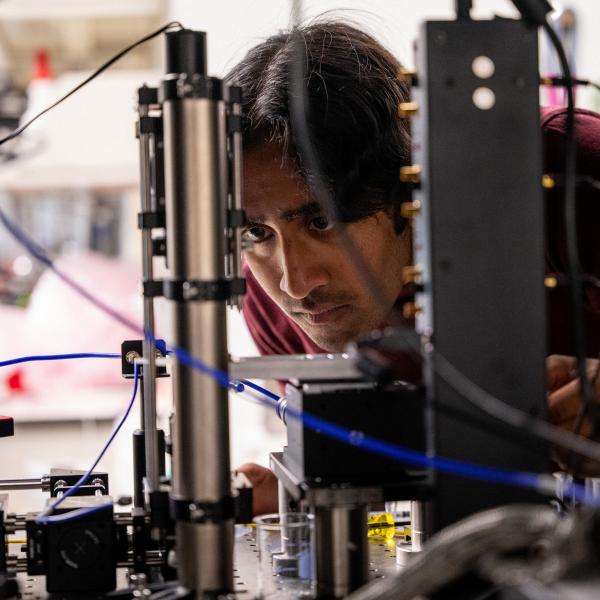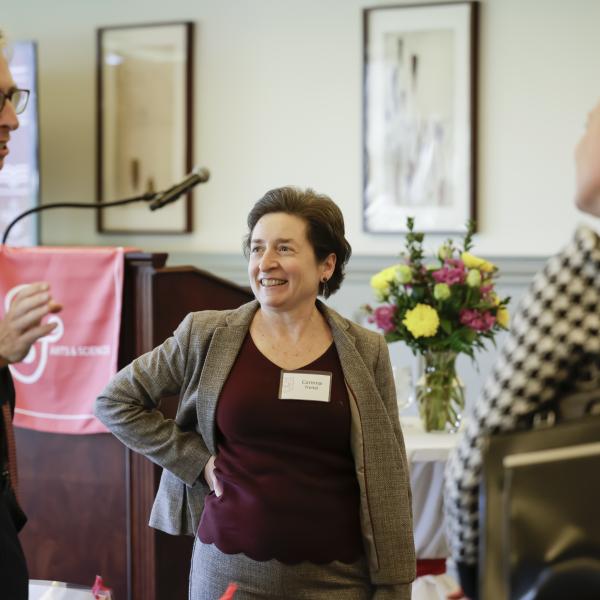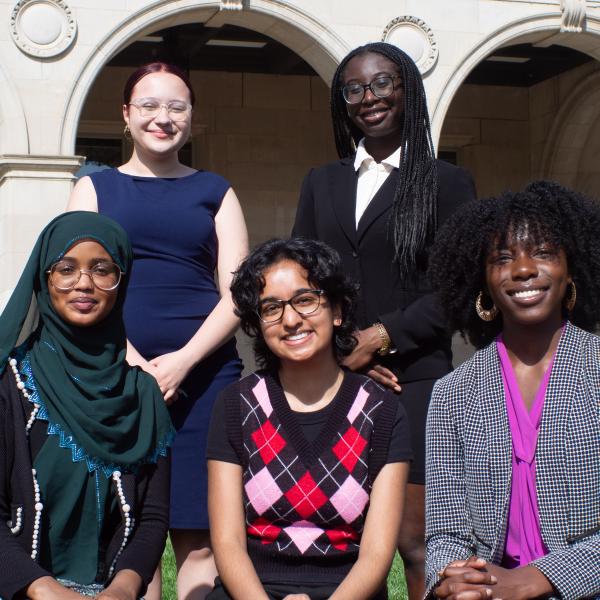Dennis Martin, associate dean in Arts & Sciences, steps down at the end of this semester after nearly four decades of service to Washington University. He sat down with the Ampersand to talk about the university, what he’s learned over the course of his career, and what’s next.
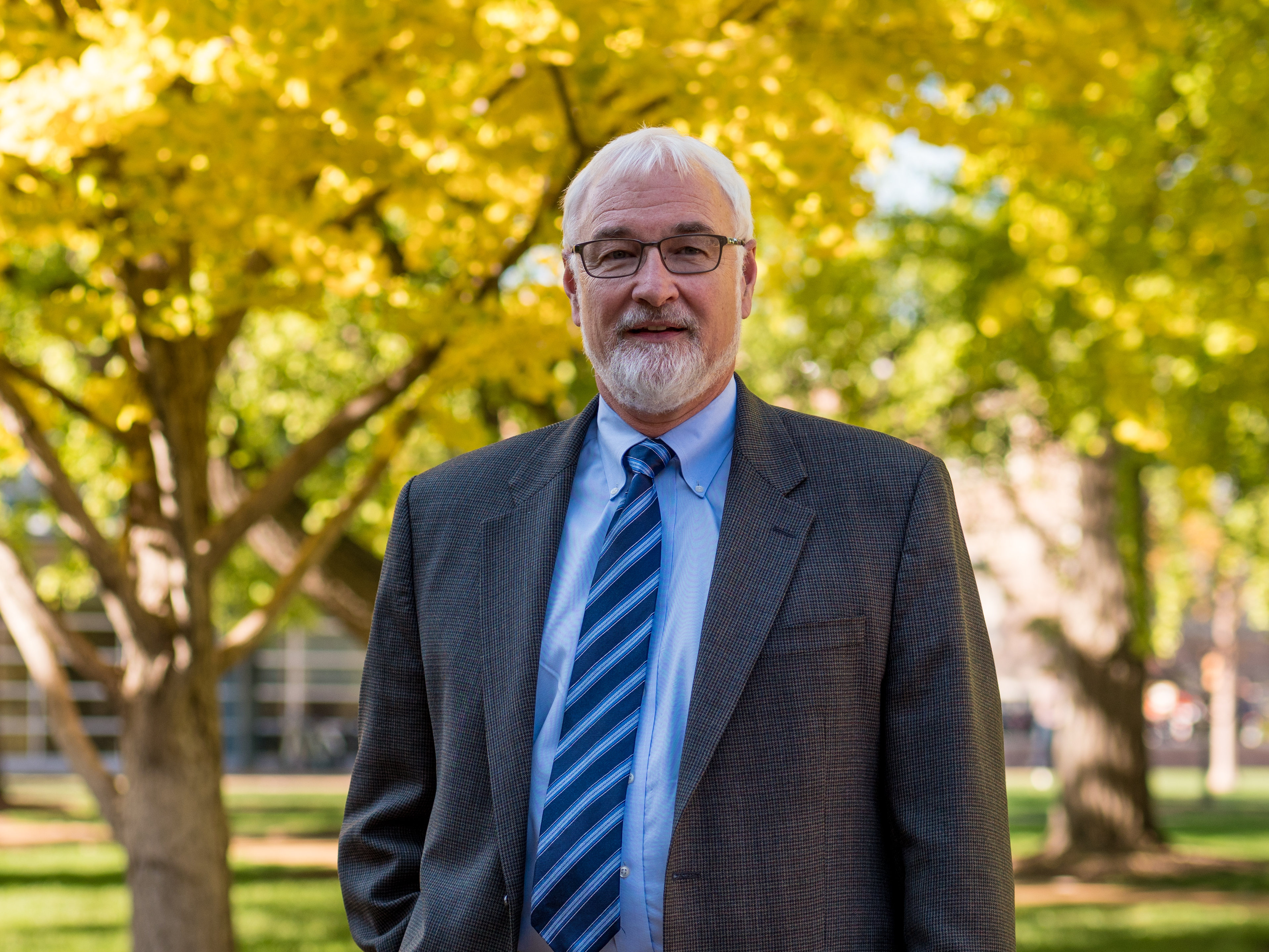
How has Washington University changed since you first started working here in 1975?
For one, just look at our undergraduate students. We have more applicants now than ever – 30,000 applications for an incoming class – and their academic preparation is really striking. Over the course of time, that wasn’t always the case. There were some years in the mid-80s when we struggled to make a class in Arts & Sciences. It’s been a sea change, in a way, and we are seeing the results in the accomplishments of our alumni, many of whom are making major impact in their chosen fields.
On the faculty side, it’s interesting to note the interdisciplinary imperative that faculty bring to their work. I think this is a function in some ways of our medium size. Because our departments are not as large as the big state universities, and even some of the private universities with whom we compete, our faculty have to get out and work with other disciplines. I think that’s actually a real plus for us. As the world has gotten more complicated, the questions our faculty pursue cross traditional boundaries and require multiple perspectives.
I’d also point to the outward-looking, external view. Under the leadership of two really terrific chancellors, Bill Danforth and Mark Wrighton, the university has moved from a regional institution, to an excellent national institution, to a renowned international university. That’s been a striking transformation. It’s been a privilege to be at WashU during these times.
What has stayed the same?
I think what’s stayed the same is the fundamental, enduring quality of the campus. What goes on here has always been special. When I first arrived on campus I was struck with the learning experience of our students, how the faculty took it so much to heart that it is important to teach and engage students in research. If you just walk around campus and see the beautiful buildings that we have, you get the feeling that this is a place that has been around for some time and will be around for a long time yet ahead.
You've had several different positions, starting in financial aid and moving into a leadership position in Arts & Sciences. What lessons did you learn along the way, and how did these prepare you for each new challenge?
I’ve learned a number of important lessons. First, surround yourself with the best people you can possibly find. Work closely with really smart and ambitious people, ambitious in the best sense of that term. Be open to learning and reinvention. Recognize that a career unfolds and evolves, sometimes in twists and turns that you can’t predict when you first start.
Being able to write and communicate well have been very important skills throughout my career. The ability to analyze problems has also been important. This is increasingly more so data driven. Understanding numbers and thinking about the implications that various forms and patterns take edges you toward synthesis, taking it beyond simple knowing of how the numbers flow and into deeper understanding about the impact data have. Out of this, an academic strategy can develop.
In recent years, Arts & Sciences has been charting a roadmap for the next 10-20 years. What are some of the key dimensions of this kind of long-range planning?
This has been a very exciting, rewarding, and challenging project. With the support of our Provost, Holden Thorp and our Executive Vice Chancellor, Hank Webber, we’re looking at the importance of faculty growth in Arts & Sciences. We’ve been growing slowly over the last decade or so, but as we compare ourselves to other institutions, we’re considerably below what most of our peers have in terms of the number of tenured and tenure-track faculty.
When we plan for growth, it’s very important that it be strategic and focused in areas where we think the university can have real impact. This affects our reputation as an institution; it affects the number and kind of graduate students we can recruit; and it brings to the forefront one of our key missions, which is of course the discovery of knowledge and its transmission. I think that will be a major objective.
Speaking of graduate students, with Bill Tate’s leadership there’s an effort to reinvigorate the PhD in a modern university. How should we be thinking about the numbers and the kinds of students we should be bringing into doctoral programs? That also plays a role in shaping our institution. At the same time, we’ll be hard-pressed to continue the excellence in our undergraduate education. There’s no declaring victory and going home. The challenge will be to think about new opportunities in our curriculum, how to keep the curriculum fresh and distinctive. Jen Smith is leading some important discussions in that area, and Mark Rollins and his staff are working hard to reimagine University College and our interactions with adult learners.
Then, alongside all of these goals, there’s what I call an enabling strategy. We must have the right infrastructure, the right number of buildings. But how do we renovate historic, iconic buildings to modernize them for the needs of our contemporary university? How do we think about new sites that might be available? I think there also are going to be infrastructure opportunities in terms of new ways to think about technology as it relates to online education, active learning classrooms, and new forms of research computing. There is also a major investment underway to vastly improve our administrative systems and our analytical capabilities – the MyDay project we are all learning about. All together, these issues frame some of the things to be thinking about as we develop our plans over the next 10-20 years.
What have you found the most rewarding in your career?
I think I’d put it into three broad categories: the culture of learning, people, and working on complicated problems.
I’m the product of a really excellent liberal arts education – at Rutgers College and an MA degree in English Literature from WashU, one that taught me the value of learning how to learn. And I have learned so much, and continue to learn every day, throughout my career. The ability to learn, to appreciate learning, and to be encouraged to learn has been a very rewarding experience to me.
In terms of the people, I’ve had great bosses, mentors, and colleagues. I’ve had a couple of guardian angels who’ve helped me in ways I probably don’t even fully know. People like Ed Macias gave me great opportunities to grow, as a professional and as a person. I think of the people where I work now, in the Dean of the Faculty office, in some ways as a family. We spend eight, nine, ten hours a day with each other. You have to have good working relationships, of course, but you also get to know these people and understand who they are. That’s really something that I’ve valued over my years here. It’s also been rewarding to learn from other people across the university, both in the central administration and in the professional schools.
Finally, it’s been very rewarding to work on complicated problems and complex systems. This is really what the university is. We have enormous responsibility. We have ambitious ideas. We have a really smart, bright faculty that’s never standing still. I’ve also come to see that part of what makes our jobs as administrators special is that we work for the future. We enroll a first-year class that will define the nature of the university over the next four years. We hire bright young scholars to join our faculty. Hopefully they get tenure and have very productive careers in the academy and shape the university for years to come. We bring in graduate students who work anywhere from 5-8 years on a PhD program – and the academic enterprise is continually renewed. The complexity of the university and its challenges, the problems we work on day-to-day, it is all enormously intellectually gratifying. And it’s very exciting to know that you’re somehow part of a future that’s being shaped and defined every day.
As you look ahead, what overarching principles should guide the university's future?
I think the future of the university and the future of Arts & Sciences are deeply entwined. Arts & Sciences is poised to move the university forward in very exciting and important ways. This is due in no small part to the visionary leadership of Dean Schaal. She’s really done some extraordinary things in the years she’s been in this position. We have a sociology department that has been reformulated; we’ve made Women, Gender, and Sexuality Studies and African and African-American Studies academic departments; we’ve recruited outstanding faculty; we have a Driving Discovery initiative that’s begun with the Bryan Hall renovation; new plans for renovations in physics are being developed. Plans are in the works for continued improvements in the sciences, and also bold new ideas in the social sciences and the humanities. Barbara Schaal has just been a wonderful dean to work with and for, and her vision is going to push the university forward in important ways. For Washington University to thrive and go on to yet another level of excellence, Arts & Sciences has to thrive. Arts & Sciences will be an exciting place to be in the years ahead.
What's next for you?
On a personal level, I have an expanding family with two grandchildren and third arriving this summer. My youngest daughter is getting married this summer. Our family is developing and growing, and I want to spend more time with them. I’m looking forward to traveling with my wife, since we haven’t had much of a chance to really get away with the demands of our jobs.
In term of activities, I want to be a better bird watcher and look forward to more time on the trails. I look forward to reading more and to time for volunteer service. I still play ice hockey, after having spent my high school and college years playing, and maybe there’s a league for aging hockey players I can help organize so we can huff and puff around the ice. I’m also exploring some ideas for part-time work with the university on some of the big projects underway. It’s all still under discussion, but it’s a possibility that I’d welcome.
